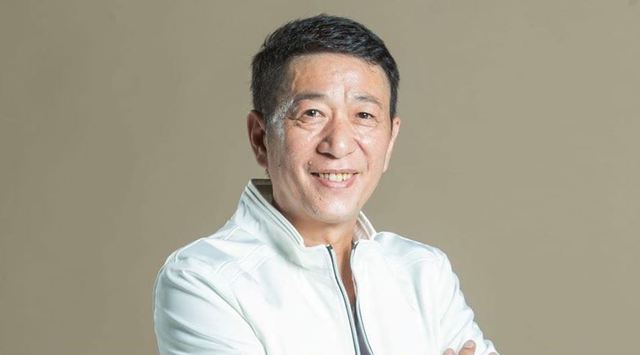Brief altercations at Taiwan Taoyuan International Airport this morning when pro-Beijing gangsters broke through police lines and tried to assault Hong Kong activists.
About 200 people mobilized by the pro-unification Patriot Association (愛國同心會) and pro-Beijing gangsters gathered at Taiwan Taoyuan International Airport to protest the arrival of Hong Kong activist Joshua Wong (黃之鋒) and pro-self determination legislators early today and clashed with police as they tried to assault them.
Wong, who played a leadership role in Hong Kong’s Umbrella Movement, Eddie Chu (朱凱廸), Edward Yiu (姚松炎) and Nathan Law (羅冠聰), legislators who advocate for the territory’s self-determination, were invited to Taiwan to participate in a forum on self-determination held in Taipei this afternoon (Jan. 7) and tomorrow.
More than 100 police officers and plainclothes security were deployed at the airport to ensure the visitors’ safety. About 200 pro-unification protesters were waiting for them in the lobby, shouting slogans and brandishing banners and placards with messages such as “roll back Hong Kong independence” and “Taiwan independence is a dead end.”
As the four visitors and their escorts were preparing to leave the airport, black-clad men broke through the police line and attempted to assault them. In the confusion, a visibly shaken Wong and his three companions were able to enter a vehicle that was waiting for them in the parking lot and left the airport.
Besides its quasi-permanent presence at Taipei’s Ximending shopping district and, before they were expelled by police, outside the Taipei 101 skyscraper, the pro-unification Patriot Association is notorious for its physical attacks on Falun Gong practitioners. In July 2008, Su An-sheng (蘇安生), a member of the Association, physically assaulted former president Chen Shui-bian (陳水扁) outside the Taipei District Court. Most members of the Association were born in China.
Members of the Association are also known to have collaborated with Chang An-le’s (張安樂) China Unification Promotion Party (中華統一促進黨) and various members of the Bamboo Union, a pro-China triad of which Chang was once a suspected leader. During the Ma Ying-jeou (馬英九) administration (2008-2016), when senior Chinese officials visited Taiwan on a more frequent basis, those organizations often mobilized to ensure “protection” for Chinese visitors and counter-protests against Taiwanese activists, whom they often assaulted. The Association advocates for unification and for Taiwanese authorities to acknowledge the so-called 1992 consensus.
Taiwanese activist and former Sunflower Movement leader Lin Fei-fan (林飛帆), who picked up the four Hong Kongers at then airport, says he has information indicating that the Four Seas Gang (四海幫), another “mainlander” triad, was also behind today’s protest.
Today’s developments reflect Beijing’s and the Chinese security-intelligence apparatus’ reliance on organized crime in Hong Kong and Taiwan to intimidate activists, members of the press and society at large. Since the Umbrella Movement in Hong Kong and the Sunflower Movement in Taiwan, Beijing authorities have sought to limit contact between activists and academics from both sides. Such efforts to isolate Hong Kong from Taiwan have accelerated since the election of Tsai Ing-wen in January 2016.
Taipei City police said it will provide protection at the hotel where the activists are staying.
Legislators from Taiwan’s New Power Party, as well as Lin Fei-fan, were also scheduled to speak at the “Self-Determination Power: 2017 Taiwan and Hong Kong New Members” forum (自決力量:2017台港新生代議員論壇). Soon after the forum began in the afternoon, members of the China Unification Promotion Party protested outside and clashed with police when they attempted to enter the building.

You might also like
More from China
A Few Thoughts on the Meng-Spavor-Kovrig Exchange
It is hard not to see this weekend’s developments as a victory for China and the creation of a world …
In Memoriam: Lee Teng-Hui and the Democracy That He Built
The former president of Taiwan is the incontestable refutation of the belief that history is merely an impersonal force, that …
The Making of ‘Insidious Power: How China Undermines Global Democracy’
A new book released on July 30 takes a close look at the agencies and mechanisms of CCP 'sharp power' …









